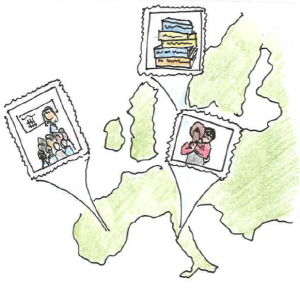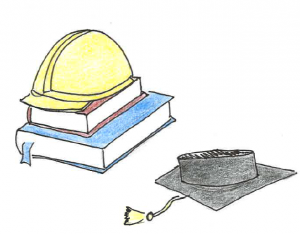Isabel Stockton is a doctoral student in the Department of Economics, sponsored by the Economic and Social Research Council. The views and opinions expressed in this article are those of the author and do not necessarily reflect the official policy of the ESRC, although they are supported by the Bristol Doctoral College.
Within the university: Fight for your funding
As PGRs, we transcend groups that are often talked about as separate entities, namely university students and academic staff. As the UK negotiates its exit from the EU, we – or future cohorts of PGRs – are likely to be affected in both of these roles. The Treasury has recently announced that the government will underwrite bids for EU Commission funding made before the UK’s exit. This is excellent news that mitigates the uncertainty about our participation in collaborative European research in the short term. However, no commitment to preserving the fee status of EU students beyond this year’s incoming cohort has been made by the University or the government. At last month’s #bristolisglobal event, Pro-Vice Chancellor International, Dr Erik Lithander suggested that the University may decide to make up for any shortfall in government funding for EU students’ tuition. As we all know, securing funding for research and for research students is no walk in the park even at the best of times. Brexit constitutes a considerable financial risk for the University, so help make the PGR case for our funding priorities.
Like many of the students and researchers around me, the referendum result did not worry me about any immediate change to my status as much as a change in political culture brought about by the campaign leading up to it. Whilst the rhetoric of either camp gave cause for concern, the leave camp’s anti-intellectualist argument that culminated in Michael Gove’s statement that “People in this country have had enough of experts”, should attract our particular attention as researchers. Now is the time to shout about our love for rational debate, for empiricism, for limiting the range of plausible disagreement by facts. Celebrating a plurality of methods and questioning established truths is at the heart of research. We must not allow those who would like prejudice to go unquestioned to co-opt the language of inclusion of dissenting voices. This is the time to show the public that while research may and should allow space for disagreement, it is not arbitrary.
Stand up to racism: This is our home
None of us can have failed to notice the increase in derogatory comments and hate crime related to race and ethnicity reflected in anecdotes as well as statistics since the referendum. We cannot tolerate our fellow citizens being told to “go home”, so speak up when you witness abuse and report it to the police. The Equality and Human Rights Commission has published an advice sheet collecting contacts and information on your rights in this respect. But outside of acute incidents, you can contribute towards an inclusive, supportive environment for migrants, at universities and beyond. Get involved with campaigns like #WeAreInternational and #BristolisGlobal or start your own and if you can, directly support migrants and refugees by donating or volunteering.
Journalist Nicholas Barrett’s emotional statement, “We will never know the full extent of the lost opportunities, friendships, marriages and experiences we will be denied” went viral immediately after the referendum. But the personal side of European integration that he refers to was never about directives and white papers and green papers. Freedom of movement certainly helped, but to those of us with first-hand experience of intra-EU migration it has always been painfully clear that it is far from perfect or hassle-free anyway. On top of that, as we keep being reminded of, nothing has legally changed so far. So bite the bullet and do the paperwork, now and in the future, and live a European life. Apply for funding from your sponsor, your School, the Alumni foundation, research societies, or the government (and the EU while you can). Do fieldwork, attend events, network, do a placement abroad. And if you want to really make your point and be a part of a cross-national European marriage, Twitter has seen proposals to unspecified people with European passports…
The overwhelming majority of academics’ voices in the run-up to the referendum favoured a remain vote. The result, however, revealed a deep divide by education and socioeconomic status. This calls for action on two fronts. Firstly, make education accessible to more people, to make universities more representative of society as a whole. This can take a variety of forms, from getting behind efforts within the university to widen participation through admissions strategies to supporting pupils from disadvantaged backgrounds. UoB students and staff are involved in numerous initiatives and charities tackling these issues. And secondly, redouble our efforts to make sure recommendations based on academic research are both relevant to lived experience and credible. This includes being open about our assumptions and about the limitations of what we can predict. The cultural change required to achieve this can and should be driven by PGRs.
If there is anything everyone seems to agree on at the moment, it’s that no-one knows what Brexit will actually look like, so it is up to us to shape it. Universities UK, the National Union of Students and UCU have all formulated demands for research and higher education in the upcoming negotiations. Continued membership in the European research network like other non-members such as Norway and Switzerland, funds to compensate for lost EU research funding and guarantees for EU nationals currently working and studying in the UK tend to be high those lists, with the first one now the subject of a petition to parliament. You will each have some demands to add to that, so make them heard and hold the negotiators to account. Speak up on social media, contact your MP, get out and organise in grassroots initiatives and encourage others to do the same.






